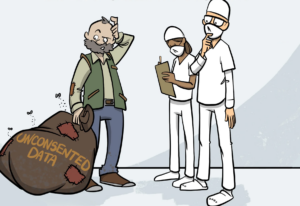Agency holding company stocks are down. Many of the biggest advertisers are struggling. Omnicom agency Hearts & Science thinks it’s found the solution to serve clients in an era of disruption.
“It’s a highly commoditized media marketplace, and will only get more so because of automation,” said Frances Ralston-Good, UK CEO of Hearts & Science. “Insight-driven business planning, which is where we are, is the thing that isn’t commoditized.”
Hearts & Science differs from its peers by guiding clients not only through their media-buying decisions, but in data and analytics. “Having a skill set [in data] is the cost of entry,” Ralston-Good said. “That moves you away from earning your keep by buying media. Because earning your keep by just buying media is the thing that’s going to drag you down.”
Ralston-Good was appointed UK CEO of Hearts & Science a year ago after serving as chief strategy and innovation officer for Omnicom UK and, before that, PHD.
She talked to AdExchanger about how she sees Hearts & Science reimagining itself for clients, and how the agency is advising clients to spend programmatically despite a crisis in confidence.
AdExchanger: How do agencies find their way as large advertisers rethink marketing budgets?
FRANCES RALSTON-GOOD: We have the most advanced, data-driven clients, and they have a lot of insights into their customer already. We’re complementary.
For those that don’t have insights into their customers, who aren’t data rich, it’s how you start capturing data, and what you can realistically gather. If you don’t have a digitally enabled relationship with your consumer base, how can you use the consumer’s behavior in the wide digital ecosystem to gain insight?
The techniques we use are the same for both. The insight you drive [as an agency] and the information you get from that insight is where we are focusing.
There are tons of direct-to-consumer startups cropping up – including Dollar Shave Club, acquired by Unilever – which have first-party data and can scale up quickly using Facebook ads. What threat do they pose to advertising giants?
Every brand is at the risk of being disrupted. My business as much as the clients’ businesses. It’s about understanding these new routes to consumers. We advise clients on how to get the most out of the ecommerce environment, and the obvious one is Amazon.
With Dollar Shave Club, there is also a frictionless experience for the consumer. That’s something that big brands can learn from.
You have to help businesses move quickly, you have to help them maintain relevance, and some of that might be through acquisition. To buy your competitors, not compete with them, is an interesting strategy to maintain competitiveness in the market.
How do you help businesses move quickly?
Switching out data sources depending on the problem you are facing, and using engineering’s agility approach. And creating flexibility within frameworks.
Three to four years ago, some of the holding companies went into ownership positions with the technologies, or with the data. For us, it’s enlightened self-interest. As a service provider, we do understand you need to grab from different places.
The programmatic space is having a reckoning as many advertisers lost trust in the system. Where does programmatic go from here?
It’s messy right now. For me, it’s a maturity issue.
The big players need to get their house in order with regards to inventory being fraudulent, or the efficacy of their technology to access good-quality inventory.
We have to make sure clients don’t fall afoul of that [and buy fraudulent inventory]. And if they do, because there are criminals out there, we have to have escalation processes in place, which have to be completely consistent.
Do you advise clients to put money through programmatic?
Our responsibility is to be absolutely clear on what that inventory is. Clients need to see that granularity. You can’t go through networks and exchanges that don’t give you that insight. Who owns what in the supply chain needs to be crystal clear as well. That’s where we are as an agency.
Many agencies seem to be shifting spend from the open marketplace to the private marketplace.
It depends on the advertiser you’re dealing with.
Eight years ago, everyone was saying, who cares about context, it’s all about audiences. I think that’s been disproved. That has evolved now so brand advertisers are using context [sometimes through private marketplaces] and technology to talk to consumers.
The performance end of things is the bit where it needs more rigor. There is a difference between generating ROI versus generating an outcome. You can play the system and buy inventory that isn’t great to get ROI. Some of the performance clients are happy for that trade-off. Quality of inventory is a very different point than fraudulent inventory.
That is why we need to build windows into the inventory where clients can log in and see where their ads are appearing.
Did Hearts & Science avoid the concerns around supply chain? If so, how?
We had viewability and ad fraud technology on our buys, on our dime, from the first time we had our programmatic platform set up. That was Scott Hagedorn. We didn’t make a big deal of that with clients. Now it’s become an issue because others haven’t, and you get into the issue of proving you’re an innocent man.
This interview has been condensed and edited.














